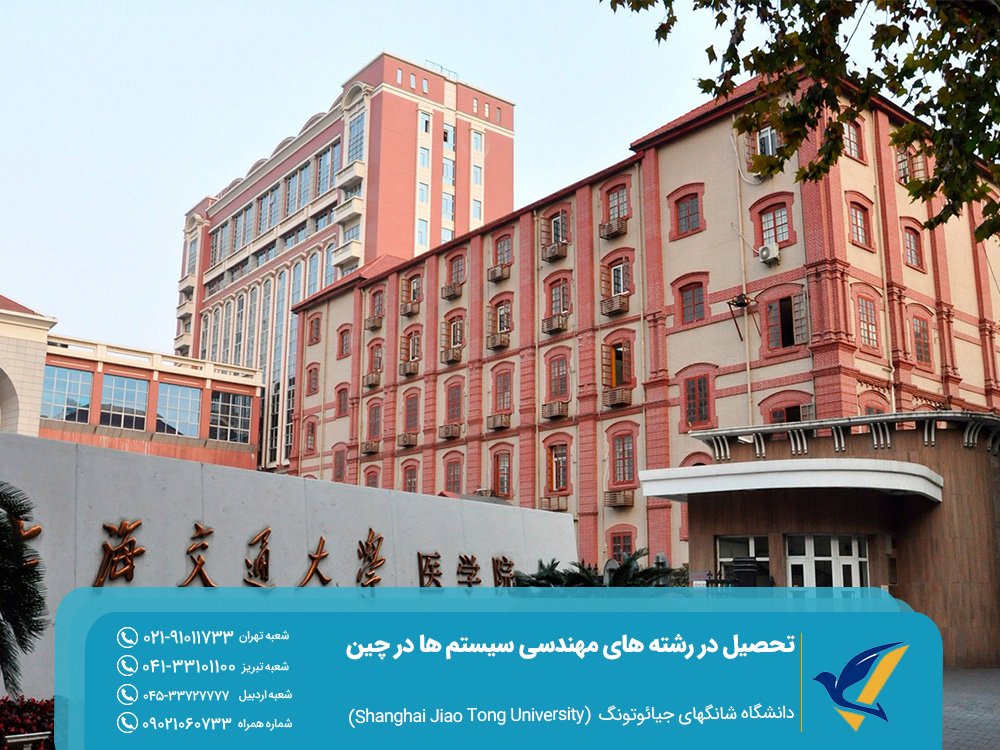China has emerged as one of the world’s main centers for engineering education. Studying Systems Engineering in China has become an attractive option for international students due to the Chinese government’s significant investment in educational infrastructure, technological advancements, and international collaborations. As an interdisciplinary field combining engineering, management, and information technology, Systems Engineering plays a vital role in China’s industrial and technological advancement.
Given China’s future-focused plans centered around technological innovation, the top Chinese universities offering Systems Engineering programs have upgraded their curricula to meet global standards through advanced laboratories, experienced faculty, and collaborations with major industries. Another reason students choose to study Systems Engineering in China is the cost of education, which is significantly more affordable compared to similar programs in the United States, the United Kingdom, or Australia.
Systems Engineering in China is closely linked to leading industries, including artificial intelligence, the Internet of Things, and smart cities. This connection provides students with abundant internship and employment opportunities. In this article from Elm Vira’s website, we explore Systems Engineering education in China and offer an introduction to the field.
Introduction to Systems Engineering in China’s Educational System
Systems Engineering holds a prominent position in China’s academic structure and is considered one of the top fields of study in the country.
As an interdisciplinary field, Systems Engineering in China integrates engineering sciences, management, applied mathematics, and information technology. The development of Systems Engineering education in China began in the late 1980s to meet the country’s growing industrial and technological needs and has gained even more strategic importance in recent years. The leading Chinese universities offering Systems Engineering have designed their academic programs based on international standards, with a strong focus on innovation.
China’s Ministry of Education (MOE), in collaboration with the Chinese Society for Systems Engineering (CSSE), has established strict educational standards for this discipline. These standards include a mix of theoretical coursework, practical projects, and industrial internships. According to the QS academic rankings, China ranks second globally after the United States in Systems Engineering education. This achievement is the result of annual investments of over 100 billion yuan (approximately 15 billion USD) in higher engineering education, a substantial portion of which is dedicated to developing educational and research infrastructure in Systems Engineering.

Curriculum and Educational Structure of Systems Engineering Programs
The curriculum for studying Systems Engineering in China is comprehensive and flexible. At the undergraduate level, students are introduced to foundational courses such as advanced mathematics, engineering physics, computer programming, and the principles of systems engineering. In the later years, the focus shifts to specialized subjects such as systems analysis and design, optimization, simulation, artificial intelligence, project management, and automated control systems.
At the master’s and Ph.D. levels, the top universities in China offer a wide range of specialized tracks, including Intelligent Systems Engineering, Information Systems Engineering, Energy Systems Engineering, Transportation Systems Engineering, Manufacturing Systems Engineering, and Biological Systems Engineering. Many of these programs are practice-based and project-oriented—an approach that is considered one of the key strengths of studying Systems Engineering in China.
A noteworthy aspect of the educational structure is the emphasis on inter-university and international collaboration. Many of China’s leading universities offer joint degree programs with prestigious institutions such as MIT, Stanford, and Imperial College London. These programs are typically taught in both Chinese and English. At many of the top universities offering Systems Engineering in China, international programs are delivered entirely in English, providing an excellent opportunity for foreign students. Additionally, Chinese language preparatory courses are also available for international students.

Advantages of Studying Systems Engineering in China
Studying systems engineering in China offers numerous advantages, making it one of the top choices for international students. One of the most significant benefits is the affordability of studying systems engineering in China compared to Western countries. In addition, the high quality of education and access to advanced technologies further enhance the appeal of studying in China. Top Chinese universities in the field of systems engineering have made substantial investments in educational and research infrastructure.
According to the annual report from China’s Ministry of Science and Technology, Chinese universities are equipped with over 2,000 advanced research laboratories dedicated to systems engineering. Of these, 150 labs are ranked at the national and international levels. Another major advantage is the broad job opportunities available to graduates. With China’s rapidly growing economy and its heavy investments in artificial intelligence, the Internet of Things, and smart cities, the demand for skilled systems engineers continues to rise.
Studying systems engineering in China also enables students to collaborate with leading companies such as Huawei, Alibaba, Tencent, and Xiaomi. For instance, most systems engineering students at Tsinghua University complete at least one internship with a major tech company during their studies.
Top Universities for Systems Engineering in China
In recent years, studying systems engineering in China has become a popular choice for international students. This growing interest is due to the high academic standards, cutting-edge facilities, affordable tuition, and extensive career prospects. The top universities for systems engineering in China have achieved strong global rankings, thanks to substantial government investments and widespread industry partnerships.

1. Tsinghua University
Tsinghua University, recognized as the top engineering university in China, is a leader in systems engineering education and research. Its Department of Automation, established in 1970, is one of the oldest and most prestigious centers for systems engineering in Asia. According to the QS World Rankings, Tsinghua University ranks 9th globally in the field of control and automation systems engineering. The university is home to the National Key Laboratory of Complex Systems and Intelligent Control, which conducts advanced research projects in artificial intelligence, cyber-physical systems, and industrial IoT, with an annual budget exceeding 200 million yuan (approximately USD 28 million).
Tuition fees for studying systems engineering at Tsinghua University are approximately 40,000 yuan (USD 5,700) per year for undergraduate programs, 45,000 yuan (USD 6,400) for master’s programs, and 50,000 yuan (USD 7,100) for doctoral programs. Each year, the university awards around 100 fully funded scholarships to outstanding international students in engineering disciplines.
2. Peking University
Peking University, with its School of Systems Engineering and Information Technology, is another leading institution for systems engineering in China. Founded in 1985 and later merged with the School of Computer Science in 2010, it has become a major center for systems engineering education and research in northern China. The school is known for its excellence in complex systems analysis and design, modeling and simulation, and intelligent systems. Its Intelligent Systems and Decision-Making Laboratory, in collaboration with major companies like Huawei and Baidu, conducts applied research in smart decision-making systems, deep learning, and natural language processing.
Tuition fees for systems engineering at Peking University are approximately 38,000 yuan (USD 5,400) per year for undergraduate studies, 42,000 yuan (USD 6,000) for master’s programs, and 48,000 yuan (USD 6,800) for PhD programs. The university also offers a prestigious international program called “Yenching Academy,” which provides full scholarships to exceptional international students, offering them a unique opportunity to study systems engineering in China while learning the Chinese language and culture.

3. Shanghai Jiao Tong University (SJTU)
Shanghai Jiao Tong University, through its School of Electronic, Information, and Electrical Engineering, is a pioneer in systems engineering education in eastern China. It is especially renowned for its expertise in transportation systems engineering, energy systems engineering, and manufacturing systems engineering. According to the Academic Ranking of World Universities (ARWU), SJTU ranks among the top 20 universities globally in the field of systems engineering and automation. Its Intelligent Systems and Robotics Research Center, with an annual budget of 150 million yuan (approximately USD 21 million), is considered one of the most advanced research centers in Asia.
The center leads innovation in advanced robotics technologies for industrial, medical, and aerospace applications. Tuition fees for studying systems engineering at SJTU are approximately 37,000 yuan (USD 5,300) per year for undergraduate programs, 40,000 yuan (USD 5,700) for master’s programs, and 45,000 yuan (USD 6,400) for doctoral studies. The university offers the “Shanghai Government Scholarship” in cooperation with the Shanghai Municipal Government, which is awarded annually to 200 international students pursuing engineering programs.
4. University of Science and Technology of China (USTC)
The University of Science and Technology of China (USTC) is another top-tier institution for studying systems engineering in China. Supervised directly by the Chinese Academy of Sciences, USTC is known for cutting-edge research in artificial intelligence, quantum computing, and autonomous systems. Its School of Information Science and Technology is a leader in control theory, signal processing, and intelligent decision-making systems.
USTC’s National Laboratory for Quantum Computing, in collaboration with the Chinese Academy of Sciences, conducts advanced research projects applying quantum computing in systems engineering. The university also offers the “USTC Presidential Scholarship”, which fully covers tuition and living expenses, and is awarded annually to 50 outstanding international students.

5. Studying Systems Engineering in China: Fudan University
Located in Shanghai, Fudan University is another top-tier institution for systems engineering studies in eastern China, through its School of Information Science and Engineering. The university is particularly well-known for its programs in financial systems engineering, information systems, and biomedical systems engineering. According to the QS World University Rankings, Fudan ranks 30th globally in electronic engineering and control systems.
Fudan’s Intelligent Financial Systems Research Center conducts advanced projects in partnership with major institutions like the Industrial and Commercial Bank of China (ICBC) and the Shanghai Stock Exchange. Key research areas include risk modeling, fraud detection, and algorithmic trading systems.
Admission Requirements for Systems Engineering Programs in China
To gain admission into systems engineering programs in China, international applicants typically need:
- A bachelor’s degree in engineering, mathematics, or computer science with a strong academic record.
- English language proficiency, demonstrated by an IELTS score of 6.0–6.5 or a TOEFL score of 80–90.
- For programs taught in Chinese, applicants must have an HSK Level 4 or higher.
China’s top universities in systems engineering are not only highly ranked domestically but also globally recognized, with programs aligned with international academic and research standards.
Application Process and Deadlines
The application package typically includes:
- Academic transcripts and diplomas
- Language proficiency test scores (IELTS, TOEFL, or HSK)
- A resume (CV)
- A statement of purpose (motivation letter)
- Letters of academic recommendation
For graduate-level programs, relevant research or work experience can provide a significant advantage.
Application for the Fall semester (starting in September) opens as early as November of the previous year and typically runs through April. However, for those hoping to receive scholarships, it is strongly recommended to apply by January or February.

Tuition Fees for Systems Engineering in China
The cost of studying systems engineering in China is one of the country’s most compelling advantages for attracting international students. Compared to Western countries, tuition fees in China are significantly more affordable—even at the top universities.
At leading institutions such as Tsinghua University and Peking University, the annual tuition fees are approximately:
- Undergraduate programs: ¥26,000 – ¥40,000 (≈ $3,700 – $5,700)
- Master’s programs: ¥29,000 – ¥45,000 (≈ $4,100 – $6,400)
- Doctoral programs: ¥33,000 – ¥55,000 (≈ $4,700 – $7,800)
At tier-two universities, such as Beijing University of Technology and Jilin University, tuition costs are even lower, generally ranging from:
- ¥18,000 – ¥30,000 per year (≈ $2,500 – $4,300)
Living Expenses in China
In addition to low tuition, living costs in China are also quite manageable. According to data from the China University Association (CUA), the average monthly living expenses for international students are:
- ¥2,500 – ¥4,000 (≈ $350 – $570) in major cities like Beijing and Shanghai
- ¥1,500 – ¥2,500 (≈ $210 – $350) in smaller cities
These costs typically cover accommodation, food, transportation, and basic personal expenses, making China a cost-effective destination for high-quality engineering education.

Job Market for Systems Engineering in China
The job market for systems engineering in China is considered one of the most dynamic and rapidly growing in Asia. According to the China Labor Market Institute (CLMI) report, the demand for systems engineering specialists has significantly increased over the past five years, growing at more than twice the average rate of other engineering fields. This surge in demand is a direct result of China’s strategic focus on developing advanced technologies such as artificial intelligence, the Internet of Things, cloud computing, and industrial automation. Graduates in systems engineering have diverse job opportunities across various sectors after completing their studies in China.
The main industries employing these graduates include information and communication technology, smart manufacturing, energy and environment, transportation and logistics, finance, and banking, among others. Leading companies such as Huawei, ZTE, Alibaba, Baidu, Tencent, and Xiaomi offer hundreds of job openings annually for systems engineering professionals.
The average starting salary for bachelor’s graduates in systems engineering in major Chinese cities ranges between 10,000 to 15,000 RMB (approximately 1,400 to 2,100 USD) per month. Studying systems engineering in China also paves the way for employment after graduation. According to new Chinese regulations, international graduates from top Chinese universities in systems engineering can stay in China for up to two years after graduation to seek employment, and if they find a suitable job, they can obtain a work visa.
Summary
Studying systems engineering in China offers an exceptional opportunity for international students seeking high-quality education at an affordable cost. With substantial investment in technology and innovation, China has become one of the leading hubs for engineering education worldwide. Top Chinese universities in systems engineering have gained not only regional but global recognition and maintain close collaboration with leading industries, providing graduates with diverse employment opportunities.
The cost of studying systems engineering in China is one of its most significant advantages, being much more affordable compared to European and American countries. Additionally, numerous scholarships are offered by the Chinese government and universities, which can substantially reduce expenses. Studying systems engineering in China is a great opportunity for those who want to gain up-to-date knowledge while experiencing the culture and language of one of the world’s most influential countries.
Elm Vira Immigration Institute supports you throughout the entire admission process—from document translation, visa issuance, flight ticket purchase, tuition fee payments, and transfers, to dormitory booking and accommodation—to help you achieve your desired results with the least time and cost. If you are interested in studying and residing in China, for more information about post-study residency in China and to receive free consultation, you can contact our experts at Elm Vira Immigration Institute.
میانگین امتیازات 5 از 5
Vote count: 1 Vote